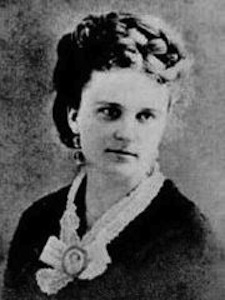Kate Chopin

'
Kate Chopin (1850 - 1904), born Katherine O'Flaherty in St. Louis, Missouri on February 8, 1850, is considered one of the first feminist authors of the 20th century. She is often credited for introducing the modern feminist literary movement. Chopin was following a rather conventional path as a housewife until an unfortunate tragedy-- the untimely death of her husband-- altered the course of her life. She became a talented and prolific short story writer, influenced primarily by the French short story author, Guy de Maupassant. She is best known for her novel The Awakening (1899), a hauntingly prescient tale of a woman unfulfilled by the mundane yet highly celebrated "feminine role," and her painful realization that the constraints of her gender blocked her ability to seek a more fulfilling life. Many of her works are featured in our Feminist Literature - Study Guide

Commenting on the influence of Maupassant on her writing, Chopin wrote:
"...I read his stories and marveled at them. Here was life, not fiction; for where were the plots, the old fashioned mechanism and stage trapping that in a vague, unthinkable way I had fancied were essential to the art of story making. Here was a man who had escaped from tradition and authority, who had entered into himself and looked out upon life through his own being and with his own eyes; and who, in a direct and simple way, told us what he saw.." [source: Jane Le Marquand, Deep South (1996)]
Chopin's settings for many of her stories is in north central Louisiana, many in Natchitoches. She published two significant short story collections; Bayou Folk in 1894, and then A Night in Acadie in 1897. She remains one of our favorite authors for her exceptional gift with words, use of irony, and range of evocative writing themes. Reader will find gems of her work in both collections, most of which are offered as links on the left of this page.
Some argue that modern feminism was borne on her pages, and one needs to look no further than her 1894 short story The Story of an Hour to support the claim. We encourage students and teachers to use our The Story of An Hour - Study Guide to better understand the work and its role in launching modern feminist literature. The reader should note the relationship of the leading figure in that story to the circumstances of Kate Chopin’s own life, where the death of her own husband started a process that would ultimately push her beyond the roles of wife and mother of six and on to the life of an artist. After The Story of an Hour, a reader would do well to balance the scale and turn their attention to a work that embraces rather than challenging conventional roles for women: Regret is a short story blessed with love and borne from a mother's heart.
Desiree's Baby (1893), and The Storm (1898), which is a sequel to her story At the 'Cadian Ball (1892), are also among her most celebrated short stories.
Chopin's writing career began after her husband died on their Louisiana plantation in 1882 and she was struggling financially. Her mother convinced Kate to move back to St. Louis, but died shortly thereafter leaving her alone. Now Chopin, suffering from the loss of her husband and mother, was advised by her obstetrician and family friend to fight her state of depression by taking up writing as a source of therapeutic healing, a way to focus her energy and provide Chopin with a source of income. She took the advice to heart.
Hi! I am a robot. I just upvoted you! I found similar content that readers might be interested in:
https://americanliterature.com/author/kate-chopin/bio-books-stories